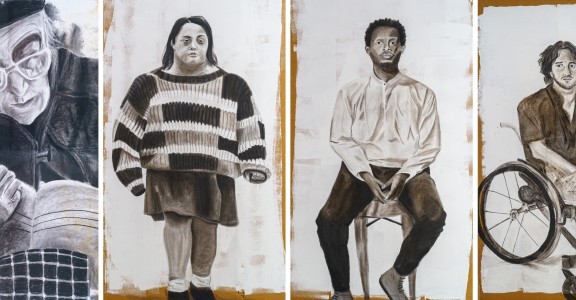Ta’ir Bira: The Invisible People

Curator: Nurit Tal-Tenne
Ta'ir Bira (2000-2023) was murdered at Kibbutz Beeri on the 7th of October, 2023.
Featured in the exhibition are six large portraits in charcoal and white chalk completed between 2018-2020.
"I chose to deal with the subject of marginalized people, some would call them the "invisible people," those who live among us, as part of our society, but do not receive proper attention, whether from society or from various institutions.
I chose to use large formats and draw the figures as life-size as possible in order to convey to the viewer that he or she is viewing a person like him or herself, who also has a right to exist and to be seen as an equal.
The use of black charcoal and white chalk generates a slightly melancholy picture that reflects their difficult situation. The cardboard on which I drew reflects the fragility and everyday nature of these figures. They are a low stratum, not of high quality, like cardboard boxes in the grocery store.
The six figures represent different populations in society that experience obliviousness and inattentiveness. I chose to hang each painting separately to convey to the viewer that these figures are all around us, an inseparable part of our society.
The Disabled represents people with disabilities who do not receive enough allowances.
The Street Cleaner represents people with jobs that are considered undesirable and who are seen as failures. They are ignored by society, which does not appreciate enough those who make sure that the path we walk upon is clean.
The Holocaust Survivor represents the Holocaust survivors in our country, which takes their compensation money. A large number of Holocaust survivors live in poverty and suffer from hunger.
A girl with Down syndrome represents people with special needs, who experience rejection from society and suffer from a lack of appropriate institutions.
The Refugee represents the population of refugees who are in Israel seeking asylum, who live in slums such as South Tel Aviv and usually have poor jobs, if employed at all. They suffer from poor treatment from the State (for example: a desire to deport them, some do not hold a Health Insurance card, etc.)
And the Senior Citizen.
I chose to deal with marginalized people because I feel that I have a high sensitivity towards them. When I see them walking past me on the street, I get a twinge in my heart every time. When I encounter, for example, a street cleaner, I try to pay attention and appreciate him. In addition, when I see people with disabilities/special needs, I try to treat them like everyone else and not be deterred." Tair Bira
Sherover Lobby
1.5.24-30.5.24
Ta'ir Bira, Untitled, 2019-2020, charcoal and chalk on cardboard



